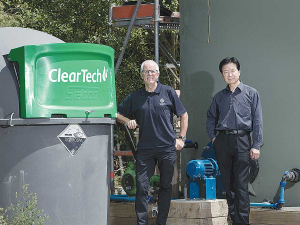Environment Canterbury urges buyers to check wastewater systems on rural properties
Buying or building a rural or semi-rural property? Make sure you know where the wastewater goes, says Environment Canterbury.
 Professors Keith Cameron and Hong Di with the Lincoln University Dairy Farm ClearTech Effluent Treatment System.
Professors Keith Cameron and Hong Di with the Lincoln University Dairy Farm ClearTech Effluent Treatment System.
A Ravensdown ClearTech effluent treatment system installed at the Lincoln University Dairy Farm (LUDF) has saved over 600,000 litres of freshwater in its first month of operation.
The saving equates to the average daily use of about 3,000 people, or the amount used by an individual in eight years.
With a potential to save billions of litres of freshwater annually if used across the New Zealand dairy industry, the systems efficacy and impact is confirmed by LUDF farm manager Peter Hancox.
“Our ClearTech plant has been operational from the start of our milking season and we’re saving at least 50% of the water used to wash the yard. If we continue along this trend, then over a 10-month season we’ll achieve a total saving of 6,000,000 litres of freshwater,” he says.
Hancox notes the costs of set-up and ongoing maintenance are relatively modest, and far outweighed by the benefits that will accrue to farms and the wider community.
Working away in the background, with no extra effort on behalf of the farmer, it’s a “win-win” for farmers and their communities, as every litre of wastewater recycled is a litre of freshwater saved, he says.
The ClearTech system collects farm dairy effluent then treats it with a coagulant to bind effluent colloidal particles together in order to settle them out from the water. The treated water can then be recycled, with the leftover treated effluent being safely used to recycle nutrients back to the pasture without odour.
In addition to reducing freshwater used in the yard by about 50%, the system effectively increases effluent pond storage capacity, while at the same time reducing leaching losses of phosphate and E. coli from the treated effluent when it is applied to the land.
The technology, developed by Lincoln University Soil Science Professors Keith Cameron and Hong Di, in conjunction with commercial partner Ravensdown, won the Science & Research Award at the inaugural Primary Industries Awards, the South Island Agricultural Fieldays Agri-Innovation Award, and a Highly Commended at the 2019 National Fieldays Innovation Awards.
Hancox says as farmers the LDUF wants to do the right thing.
“So, ClearTech delivers us a system where we can make a real difference to our environmental impact without busting the budget and with no disruption to our normal farm operations.”
Lincoln University acting vice-chancellor Professor Bruce McKenzie said the development of ClearTech exemplifies the university’s significant contribution to discovering Agritech solutions to help address some of the world’s most pressing land-based challenges.
“We’re also focused on developing meaningful partnerships with like-minded organisations, and our close collaboration with Ravensdown has enabled the successful delivery of the ClearTech system to farmers,” says McKenzie.
Tickets are now available for Beef + Lamb New Zealand’s (B+LNZ) Out the Gate, returning from 19-21 May 2026 at Te Pae, Christchurch.
Dairy Women's Network (DWN) is welcoming AgriHealth as a new partner.
Northland Field Days patron Ross Newlove remembers the inaugural field days he attended 40 years ago.
Southland farmer Murray Donald has been appointed as chair of Safer Farms, the industry-led organisation focused on reducing harm, injuries and fatalities in the agricultural sector.
National Lamb Day returns this Sunday, 15 February, with Beef + Lamb New Zealand Inc calling on Kiwis to fire up their barbecues and celebrate the people and the product that put New Zealand on the world map.
When it comes to arranging the sound system at Northland Field Days, no one does it better than Colin Finlayson.
OPINION: Fonterra may be on the verge of selling its consumer business in New Zealand, but the co-operative is not…
OPINION: What does the birth rate in China have to do with stock trading? Just ask a2 Milk Company.